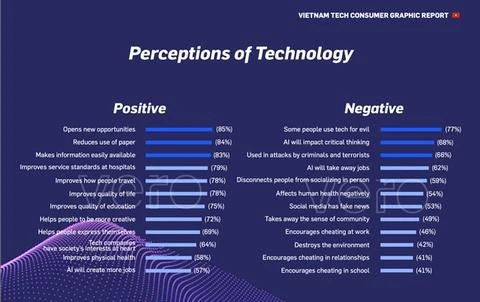 A staff of Viettel introduces about the tech giant's two "Make in Vietnam" technologies - Cyber Callbot and eKYC (Know Your Customers), a solution for customer identity verification. (Photo: VNA)
A staff of Viettel introduces about the tech giant's two "Make in Vietnam" technologies - Cyber Callbot and eKYC (Know Your Customers), a solution for customer identity verification. (Photo: VNA)Hanoi (VNA) - Vietnam has been witnessing robust digital transformation in areas where local tech companies like Viettel, FPT, and the Be Group, to name just a few, have secured a strong foothold in the domestic market.
The National Forum on Developing Vietnam’s Technology Companies was held in Hanoi last December, spotlighting digital transformation, tech companies, and “Make in Vietnam” technologies. In remarks at the forum, Minister of Information and Communications Nguyen Manh Hung said “we have heard and spoken a lot about success stories in foreign countries, and now it is time for us to tell Vietnamese stories.”
Many Vietnamese tech companies found how to create breakthroughs in the era of the Fourth Industrial Revolution between 2018 and 2020.
From a small construction company founded more than 30 years ago, the military-run mobile network operator Viettel has transformed itself into one of Vietnam’s largest telecom groups and established a trusted name not only locally but also overseas.
Viettel’s annual revenue now stands at 20 billion USD, with annual profit at more than 1.74 billion USD, said Deputy Director General Nguyen Thanh Nam. The company has remained among the world’s top 500 largest brands, he noted, adding that it also ranked top in Southeast Asia and 28th globally in the field of telecommunications.
With strong telecom networks, Viettel has focused its efforts on developing an ecosystem of various made-in-Vietnam technologies serving multiples areas, ranging from finance and health care to education and smart cities.
Viettel has successfully developed its own core technologies for 5G networks. Last year it became the sixth provider of 5G devices globally. It has now geared up to expand the 5G network for commercial use this year.
Last year, at the outset of the COVID-19 pandemic, the group was one of the first in the country to launch a telehealth service, called Viettel Telehealth, allowing people to access health care services online.
During the two months after launch, it was used by more than 1,000 clinics throughout the country and more 4,000 commune and ward-based medical stations are expected to adopt it in the near future.
Aware of the importance of digital transformation in Vietnam when the pandemic caused an unprecedented shock to the global community in early 2020, Truong Gia Binh, Chairman of telecom group FPT, called on the business community to keep themselves updated on digital trends.
IT workers in Vietnam are now as capable as those from many developed countries, Binh said. With such a workforce, Vietnam will be able to satisfy demand for digital transformation both at home and abroad.
FPT is ready to stay ahead and together with other major tech companies in the country to lead technological trends, he added.
Digital technologies bridge gaps between sectors, countries, and enterprises, and result in the growth of the digital economy with great future potential, said Nguyen Hoang Phuong, Director General of the Be Group, a ride-hailing service provider.
“If local companies do not stand up and dominate core businesses, they will lose in their own backyard,” Phuong said. “Vietnamese people must create their own technologies and digital ecosystem to become competitive and reach out to the world.”
The Be ride-hailing app holds a market share of some 30 percent in Vietnam and is locked in competition against foreign rivals like Grab and GoJek.
The company is eyeing the development of a network of convenient transport, logistics, finance, and tourism services combined in one single app, she revealed./.
























